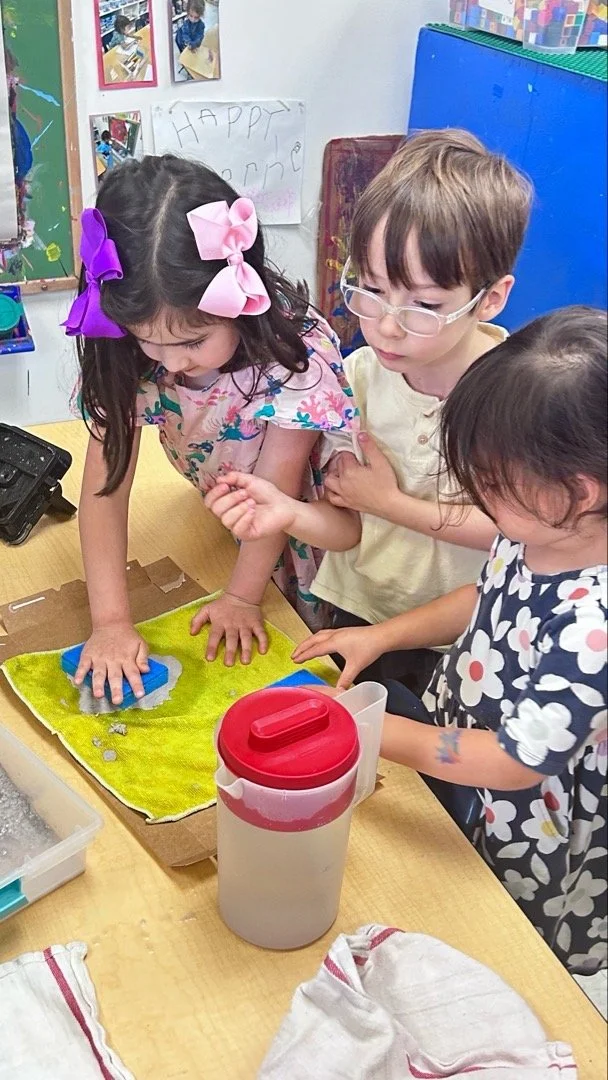Our Approach
Play-based. Child-centered. Whole-child.
Children at this age learn through play, exploration, and discovery. Our approach is to provide the best conditions, resources, and support to make this possible. This includes highly individualized attention, emergent curriculum based on the groups’ interests, and lots of freedom to keep things flowing and fun!
We believe that all children are competent human beings ready to be challenged. Informed by the best traditions of progressive early childhood education - from John Dewey’s theories on experiential learning and community to the Bank Street College developmental-interaction approach - the Collective provides a nurturing learning environment where children feel comfortable exploring and making sense of the world around them and develop a sense of themselves as someone whose feelings, capacities, and interests are validated and encouraged to grow.
Our aims for children coincide with the seven specific skills that Ellen Galinsky, President and Co-Founder of the Families and Work Institute, deems necessary for lifelong learning:
Focus and self-control
Perspective-taking
Communicating
Making connections
Critical thinking
Taking on challenges
Self-directed, engaged learning
Our teachers are gentle guides and especially skilled nurturers who work in depth with each and every student to ensure that these skills are consistently evolving. What this looks like in action:
A pair of children makes a rocket ship out of blocks and takes turns looking for space creatures through their homemade telescope.
A class of children in the park plays with a parachute, raising it up and down by coordinating their arm motions.
At the art table, children in a 3s/4s classroom prepare to create their self-portraits by looking at their eye, mouth, and hair color in handheld mirrors, and by comparing their skin color with a selection of multicultural paints, markers, and construction paper.
A group of children sits together in their classroom. They count how many large beads they add to their shoestring, then comment on how heavy their strings are getting, saying, “Isn’t it getting heavier and heavier?”
With scrap paper from the classroom, children learn how to make new sheets of paper using a blender and mesh screens.
A child who loves games is taught how to play a card game called BLINK in which children have to distinguish between color, number, and shape while figuring out which card to play.
After snack time, the children clean up their own places, walk over to the bookshelf, independently choose a book, and then browse through the pages until all children are finished.
A child who loves to scribble, draw, and write is given a blank book to compose and illustrate their very own story.
A class of children walks to a local outdoor market where their teachers show them the huge selection of pumpkins, ranging in size from the enormous to the very tiny. Together they buy some small pumpkins and bring them back to school to paint and decorate.
A child who knocks down a friend’s block building hears “I don’t like it when you knock down my blocks” from the friend, and a teacher helps the two children talk through the situation.
In the dramatic play area, a 2-year-old places a pot in the pretend oven to make dinner for their babies.
At circle time the classes of 3- and 4-year-olds figure out how many children came to school that day by counting the children sitting in the circle.
A class of children collects leaves in the park. After nap the children make a giant leaf collage together by arranging and placing their collected leaves on a long sheet of contact paper while observing the different colors and shapes of the leaves.
Our teachers are also always learning, too.
With a PhD in Teaching and Curriculum and over 25 years’ experience as an early childhood educator, our director provides teachers ongoing guidance, support, and resources throughout the school year. We also hold three professional development days per year with outside consultants. Recent workshop topics have ranged from “Neurodivergence & Social Skills” to “Collage & Art Experiences in Early Childhood Education” to “Social Identity & Implicit Bias.”
Interested in applying?
Come build with us! For the most up-to-date info on deadlines, tuition, financial aid, and open slots, click here.





